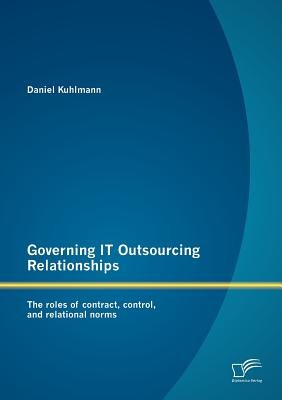
- We will send in 10–14 business days.
- Author: Daniel Kuhlmann
- Publisher: Diplomica Verlag
- Year: 2012
- Pages: 140
- ISBN-10: 3842879539
- ISBN-13: 9783842879539
- Format: 14.8 x 21 x 0.8 cm, minkšti viršeliai
- Language: English
- SAVE -10% with code: EXTRA
Reviews
Description
The dynamics of the relationship between service recipient and service provider in IS outsourcing relationships recently gained increased attention as relationships are believed to have a considerable influence on IS outsourcing success. This study adds to this growing field of interest by developing an IS outsourcing relationship framework in the form of a process model. Three rather disjointed areas of research, namely contractual governance, relational norms, and control, have been set in a common context by interrelating them as the three main governance modes that jointly influence the relationship. One in-depth case study has been conducted in order to provide first empirical evidence and to gain deeper insights into the dynamics of relationship governance. The proposed model could be confirmed in general, revealing the following insights: first, contractual and relational governance modes determine the rules that govern the relationship while control is used to execute and enforce specified rules. All three jointly influence the state of the relationship. Second, relational norms have only been observed at an individual level and not at an organizational one. Third, formal control modes have been used to execute and enforce relational norms. This finding contradicts current control theory. Fourth, while contractual and relational governance are seen as complementary and equally important, relational norms have been left completely unmanaged in the observed organization due to a lack of adequate approaches. These results are discussed in detail to outline opportunities for further research.
EXTRA 10 % discount with code: EXTRA
The promotion ends in 23d.18:19:34
The discount code is valid when purchasing from 10 €. Discounts do not stack.
- Author: Daniel Kuhlmann
- Publisher: Diplomica Verlag
- Year: 2012
- Pages: 140
- ISBN-10: 3842879539
- ISBN-13: 9783842879539
- Format: 14.8 x 21 x 0.8 cm, minkšti viršeliai
- Language: English English
The dynamics of the relationship between service recipient and service provider in IS outsourcing relationships recently gained increased attention as relationships are believed to have a considerable influence on IS outsourcing success. This study adds to this growing field of interest by developing an IS outsourcing relationship framework in the form of a process model. Three rather disjointed areas of research, namely contractual governance, relational norms, and control, have been set in a common context by interrelating them as the three main governance modes that jointly influence the relationship. One in-depth case study has been conducted in order to provide first empirical evidence and to gain deeper insights into the dynamics of relationship governance. The proposed model could be confirmed in general, revealing the following insights: first, contractual and relational governance modes determine the rules that govern the relationship while control is used to execute and enforce specified rules. All three jointly influence the state of the relationship. Second, relational norms have only been observed at an individual level and not at an organizational one. Third, formal control modes have been used to execute and enforce relational norms. This finding contradicts current control theory. Fourth, while contractual and relational governance are seen as complementary and equally important, relational norms have been left completely unmanaged in the observed organization due to a lack of adequate approaches. These results are discussed in detail to outline opportunities for further research.


Reviews